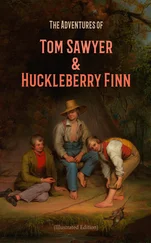"The preparations for supper diverted the attention of the Ferguson faction from the discussion of their grievance for a long time, and then, when they would have taken it up again, the happy announcement that Mr. Harris was ready drove all thought of it to the winds.
"We improvised tables by propping up the backs of car-seats, and sat down with hearts full of gratitude to the finest supper that had blessed our vision for seven torturing days. How changed we were from what we had been a few short hours before! Hopeless, sad-eyed misery, hunger, feverish anxiety, desperation, then; thankfulness, serenity, joy too deep for utterance now. That I know was the cheeriest hour of my eventful life. The winds howled, and blew the snow wildly about our prison house, but they were powerless to distress us any more. I liked Harris. He might have been better done, perhaps, but I am free to say that no man ever agreed with me better than Harris, or afforded me so large a degree of satisfaction. Messick was very well, though rather high-flavored, but for genuine nutritiousness and delicacy of fiber, give me Harris. Messick had his good points—I will not attempt to deny it, nor do I wish to do it—but he was no more fitted for breakfast than a mummy would be, sir—not a bit. Lean?—why, bless me!—and tough? Ah, he was very tough! You could not imagine it—you could never imagine anything like it."
"Do you mean to tell me that—"
"Do not interrupt me, please. After breakfast we elected a man by the name of Walker, from Detroit, for supper. He was very good. I wrote his wife so afterward. He was worthy of all praise. I shall always remember Walker. He was a little rare, but very good. And then the next morning we had Morgan of Alabama for breakfast. He was one of the finest men I ever sat down to—handsome, educated, refined, spoke several languages fluently—a perfect gentleman—he was a perfect gentleman, and singularly juicy. For supper we had that Oregon patriarch, and he was a fraud, there is no question about it—old, scraggy, tough, nobody can picture the reality. I finally said, gentlemen, you can do as you like, but I will wait for another election. And Grimes of Illinois said, 'Gentlemen, I will wait also. When you elect a man that has something to recommend him, I shall be glad to join you again.' It soon became evident that there was general dissatisfaction with Davis of Oregon, and so, to preserve the good will that had prevailed so pleasantly since we had had Harris, an election was called, and the result of it was that Baker of Georgia was chosen. He was splendid! Well, well—after that we had Doolittle, and Hawkins, and McElroy (there was some complaint about McElroy, because he was uncommonly short and thin), and Penrod, and two Smiths, and Bailey (Bailey had a wooden leg, which was clear loss, but he was otherwise good), and an Indian boy, and an organ-grinder, and a gentleman by the name of Buckminster—a poor stick of a vagabond that wasn't any good for company and no account for breakfast. We were glad we got him elected before relief came."
"And so the blessed relief did come at last?"
"Yes, it came one bright, sunny morning, just after election. John Murphy was the choice, and there never was a better, I am willing to testify; but John Murphy came home with us, in the train that came to succor us, and lived to marry the widow Harris—"
"Relict of—"
"Relict of our first choice. He married her, and is happy and respected and prosperous yet. Ah, it was like a novel, sir—it was like a romance. This is my stopping-place, sir; I must bid you goodby. Any time that you can make it convenient to tarry a day or two with me, I shall be glad to have you. I like you, sir; I have conceived an affection for you. I could like you as well as I liked Harris himself, sir. Good day, sir, and a pleasant journey."
He was gone. I never felt so stunned, so distressed, so bewildered in my life. But in my soul I was glad he was gone. With all his gentleness of manner and his soft voice, I shuddered whenever he turned his hungry eye upon me; and when I heard that I had achieved his perilous affection, and that I stood almost with the late Harris in his esteem, my heart fairly stood still!
I was bewildered beyond description. I did not doubt his word; I could not question a single item in a statement so stamped with the earnestness of truth as his; but its dreadful details overpowered me, and threw my thoughts into hopeless confusion. I saw the conductor looking at me. I said, "Who is that man?"
"He was a member of Congress once, and a good one. But he got caught in a snow-drift in the cars, and like to have been starved to death. He got so frost-bitten and frozen up generally, and used up for want of something to eat, that he was sick and out of his head two or three months afterward. He is all right now, only he is a monomaniac, and when he gets on that old subject he never stops till he has eat up that whole car-load of people he talks about. He would have finished the crowd by this time, only he had to get out here. He has got their names as pat as A B C. When he gets them all eat up but himself, he always says: 'Then the hour for the usual election for breakfast having arrived, and there being no opposition, I was duly elected, after which, there being no objections offered, I resigned. Thus I am here.'"
I felt inexpressibly relieved to know that I had only been listening to the harmless vagaries of a madman instead of the genuine experiences of a bloodthirsty cannibal.
The Killing of Julius Caesar "Localized"
Table of Contents
Being the only true and reliable account ever published; taken from the Roman "Daily Evening Fasces," of the date of that tremendous occurrence.
Nothing in the world affords a newspaper reporter so much satisfaction as gathering up the details of a bloody and mysterious murder and writing them up with aggravating circumstantiality. He takes a living delight in this labor of love—for such it is to him, especially if he knows that all the other papers have gone to press, and his will be the only one that will contain the dreadful intelligence. A feeling of regret has often come over me that I was not reporting in Rome when Caesar was killed—reporting on an evening paper, and the only one in the city, and getting at least twelve hours ahead of the morning-paper boys with this most magnificent "item" that ever fell to the lot of the craft. Other events have happened as startling as this, but none that possessed so peculiarly all the characteristics of the favorite "item" of the present day, magnified into grandeur and sublimity by the high rank, fame, and social and political standing of the actors in it.
However, as I was not permitted to report Caesar's assassination in the regular way, it has at least afforded me rare satisfaction to translate the following able account of it from the original Latin of the Roman Daily Evening Fasces of that date—second edition:
Our usually quiet city of Rome was thrown into a state of wild excitement yesterday by the occurrence of one of those bloody affrays which sicken the heart and fill the soul with fear, while they inspire all thinking men with forebodings for the future of a city where human life is held so cheaply and the gravest laws are so openly set at defiance. As the result of that affray, it is our painful duty, as public journalists, to record the death of one of our most esteemed citizens—a man whose name is known wherever this paper circulates, and whose fame it has been our pleasure and our privilege to extend, and also to protect from the tongue of slander and falsehood, to the best of our poor ability. We refer to Mr. J. Caesar, the Emperor-elect.
The facts of the case, as nearly as our reporter could determine them from the conflicting statements of eye-witnesses, were about as follows:—The affair was an election row, of course. Nine-tenths of the ghastly butcheries that disgrace the city nowadays grow out of the bickerings and jealousies and animosities engendered by these accursed elections. Rome would be the gainer by it if her very constables were elected to serve a century; for in our experience we have never even been able to choose a dog-pelter without celebrating the event with a dozen knockdowns and a general cramming of the station-house with drunken vagabonds overnight. It is said that when the immense majority for Caesar at the polls in the market was declared the other day, and the crown was offered to that gentleman, even his amazing unselfishness in refusing it three times was not sufficient to save him from the whispered insults of such men as Casca, of the Tenth Ward, and other hirelings of the disappointed candidate, hailing mostly from the Eleventh and Thirteenth and other outside districts, who were overheard speaking ironically and contemptuously of Mr. Caesar's conduct upon that occasion.
Читать дальше












